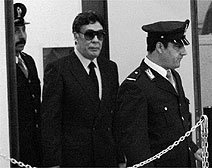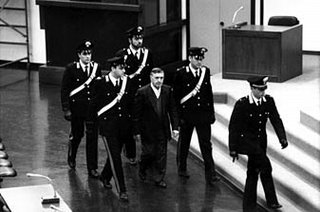 Excellent Cadavers (2005)
Excellent Cadavers (2005)
Director: Marco Turco
In 1992, Giovanni Falcone and Paolo Borsellino, two magistrates who had been working for more than a decade to break the back of the Sicilian Mafia, were murdered in spectacular bombings that outraged the people of Sicily and the rest of Italy. The saga of how they got to their fateful deaths, what they accomplished, how they were betrayed, and what has happened in the subsequent decade comprise the documentary Excellent Cadavers.
Excellent Cadavers is a 1995 book by American journalist Alexander Stille, and it formed the basis for a 1999 film of the same name. This Italian documentary uses Stille as narrator who is shown retracing the steps he took to write his book, with incidents he recounted told in "flashback" through archival film footage and interviews with individuals who knew the players and witnessed the various events of this dramatic period in Italian history. A brief history of the modern Mafia emerges as well.
Before World War II, the Mafia (referred to often in the film as Cosa Nostra) operated mainly in the countryside of Sicily. The Allied governments--as usual, incredibly shortsighted and naive--used the local Mafia leaders to keep order right after the war, and the organization got a taste of the money that could be made by expanding into the cities. During the 1970s, mafiosi from the rural region of Corleone began a bloody extermination campaign to rid themselves of rivals for the lucrative heroin trade to the United States. At this time, Giovanni Falcone a magistrate from Palermo who was working in Sicily began a painstaking investigation into Mafia crimes and their connections with the Palermo business community. The murders of mafiosi, policemen, and magistrates continued.
Eventually, a group called the Anti-Mafia Pool, whose most prominent members were Falcone, Borsellino, and magistrate Antonino Caponnetto, amassed enough  evidence to hand down indictments--thousands of pages of them put together while they were holed up for their own protection in a prison on the island of Sardinia. They were aided by the detailed information provided by a Mafia family head, Tommaso Bruscetta, who had been captured in 1982 in Brazil where he had fled after escaping from prison during a day release. Bruscetta had suffered the loss of many family members during the reign of terror of the Corleonesi, and informing was his form of revenge.
evidence to hand down indictments--thousands of pages of them put together while they were holed up for their own protection in a prison on the island of Sardinia. They were aided by the detailed information provided by a Mafia family head, Tommaso Bruscetta, who had been captured in 1982 in Brazil where he had fled after escaping from prison during a day release. Bruscetta had suffered the loss of many family members during the reign of terror of the Corleonesi, and informing was his form of revenge.
What became known as the maxi trial began in 1986 in a football-field-sized bunker built to withstand a missle attack. Again, Falcone and Borsellino were virtual prisoners along with the 474 indicted mafiosi who watched the proceedings from  cells that lined the entire rear of the courtroom. At its end two years later, the trial resulted in 360 convictions. Only a handful withstood the appeals process, and only after the Mafia-corrupted magistrate Corrado Carnevale, the "Sentence Killer," was forced to resign from the appellate court upon revelations of serious ethics violations. In 1992, the Mafia got their revenge. They killed Salvo Lima, the mayor of Palermo, for failing to halt the maxi trial, and finally got to Falcone and Borsellino. Upon the death of the latter, an extremely emotional Caponnetto was quoted on camera as saying, "It's all over."
cells that lined the entire rear of the courtroom. At its end two years later, the trial resulted in 360 convictions. Only a handful withstood the appeals process, and only after the Mafia-corrupted magistrate Corrado Carnevale, the "Sentence Killer," was forced to resign from the appellate court upon revelations of serious ethics violations. In 1992, the Mafia got their revenge. They killed Salvo Lima, the mayor of Palermo, for failing to halt the maxi trial, and finally got to Falcone and Borsellino. Upon the death of the latter, an extremely emotional Caponnetto was quoted on camera as saying, "It's all over."
Although the public rage was intense and a witness protection program that Falcone and Borsellino had urged for years was instituted in response to their murders, the decade that followed, which included the indictment of seven-time Italian prime minister Giulio Andreotti for Mafia activities, saw the work of the Anti-Mafia Pool all but dismantled by corrupt politicians. Silvio Berlusconi, Italian prime minister in the mid 1990 and from 2001-2006, clearly sided with the Mafia.
Turco's documentary goes into great detail about how Falcone basically put together a database of Mafia transactions by hand. As a Sicilian, Falcone understood the horrible toll Mafia activity took on the local economy and well-being of average Sicilians. The horrifying bloodbaths that periodically erupted--a murder occurred in Palermo every three days during 1982--are brought vividly to the screen for the outrages they are. One nauseating photo taken by Letizia Battaglia, a photojournalist who Stille speaks with intensively during the film, shows the severed head of a man sitting on the front seat of a car. After looking at such  photos and viewing the arrogant, self-pitying mafiosi whining inside their courtroom cages, Falcone's ultimately fatal crusade against the Mafia doesn't seem the act of a madman or a careerist, as Sicilian writer Leonardo Sciascia, the coiner of the phrase "excellent cadavers," seemed to imply in one comment about the maxi trial. Falcone, Borsellino, and the rest of the Anti-Mafia Pool were courageous fighters against a persistent cancer that the majority of Italians would like to see eradicated.
photos and viewing the arrogant, self-pitying mafiosi whining inside their courtroom cages, Falcone's ultimately fatal crusade against the Mafia doesn't seem the act of a madman or a careerist, as Sicilian writer Leonardo Sciascia, the coiner of the phrase "excellent cadavers," seemed to imply in one comment about the maxi trial. Falcone, Borsellino, and the rest of the Anti-Mafia Pool were courageous fighters against a persistent cancer that the majority of Italians would like to see eradicated.
I felt that I got to know Falcone and Borsellino and understand the rhythms of their lives at this time through their own words and those of their intimates. I had seen the outside of the courtroom bunker and knew about the maxi trial, but to actually see inside, to listen to Bruscetta from inside his bulletproof booth denounce one of the defendants who ordered his brother's death, was a powerful experience. I had known in my gut and from reading Sciascia's novels about the Mafia (most notably The Day of the Owl) that the Mafia is not "cool" or honorable. I never watched The Sopranos precisely because of my disdain for these thugs. How they work--and that was laid bare by Bruscetta--is of interest, if only to find effective ways to cut them apart. In Italy, the people had the will, but not the power. Unfortunately, politicians find these criminals useful, and it was politicians whose visible rejection of Falcone for promotion within the criminal justice system made him vulnerable. The results are heartbreaking not only for him, but also for the Sicilian and Italian people.
Although the use of Stille doesn't work very well, this film is still quite effective. It covers a lot of territory in a judiciously edited manner. We get enough information to make sense of the complex relationships and proceedings, but not so much that it becomes confusing. People who are very familiar with the maxi trials may not hear anything new, but the power of the images Turco put together and the pain of the people who knew Falcone and Borsellino should help them get beyond their knowledge to the emotional core of this story. The most heart-wrenching scene in the film is the public funeral of the police killed along with Falcone. The widow of one of the fallen men tries so hard to speak of love, peace, and forgiveness, but is compelled again and again to acknowledge that the Mafia has no love. "There is no love here," she chokes through her tears to her adversaries hidden in the crowd.
As a citizen of Chicago, one name kept running through my head as I watched this fine film--Mayor Richard M. Daley. His absolute power in the city and his administration's corruption (from which the Mafia likely benefits) share a lot in common with the Italian cancer. But it doesn't seem to bother a lot of people who are getting theirs in "the city that works." Public outcry, which seems highly unlikely, may be the only thing to make justice more than a motto cut into a frieze. l


2 Comments:
At 5:30 PM, shane013a said…
shane013a said…
It's a shame to be a part of the me first generation which seems to have accepted the any way you can modus operandi which glamorizes these thugs. Dying people writhing on the ground don't make for good sales like snappy songs and cutesy personalities. Why not a reality show with people joining or taking on the local thugs?
At 7:01 AM, Excellent Cadavers Movie said…
Excellent Cadavers Movie said…
Excellent Cadavers has only two things going against it: A) it gives away the ending in the first couple minutes of the movie, and B) it is way too short and never gives us a chance to really hear the whole story.
Post a Comment
<< Home